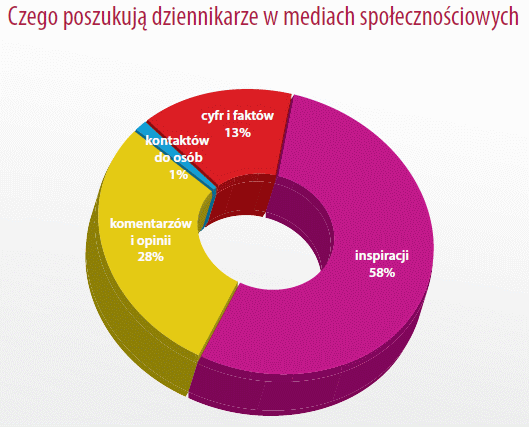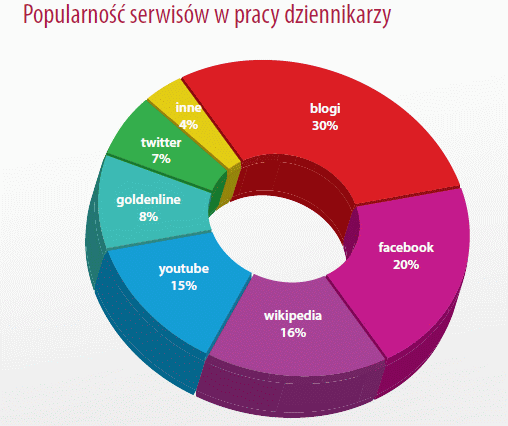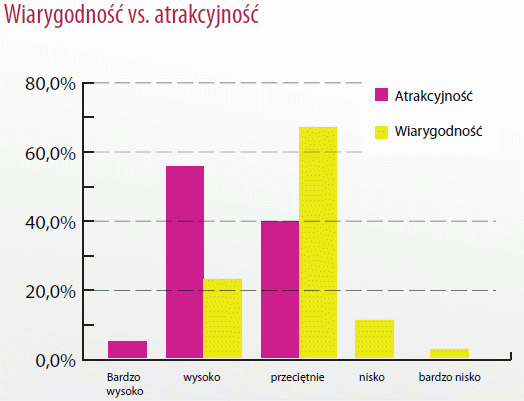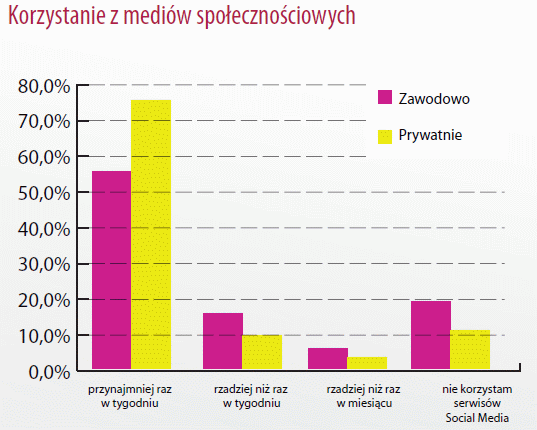 Multi Communications, Journalists and Social Media 2011
Multi Communications, Journalists and Social Media 2011Journalists most often visit blogs, which are also considered the most reliable sources of knowledge and information among all social media platforms. Facebook ranks second in both popularity and credibility, with Wikipedia following in third place. This pattern shows that the ranking for credibility aligns with the popularity ranking.
 Multi Communications, Journalists and Social Media 2011
Multi Communications, Journalists and Social Media 2011The Multi Communications study reveals that information found by journalists on social media is considered more attractive than credible. A quarter of respondents rated the credibility of such information as high, but none rated it very high. On the other hand, no one rated the attractiveness of social media content as low or very low. Around 60% of respondents rated the credibility of these sources as high or very high.
 Multi Communications, Journalists and Social Media 2011
Multi Communications, Journalists and Social Media 2011Polish journalists admit to frequently using social media platforms. Nearly two-thirds use them regularly for work, while even more use them for personal purposes, with about three-quarters of media workers indicating personal use.
 Multi Communications, Journalists and Social Media 2011
Multi Communications, Journalists and Social Media 2011The survey was conducted independently by Multi Communications in November 2011. Over 110 journalists from various media types (e.g., press, internet, TV) and covering different topics (business, new technologies, lifestyle) participated in the study.
COMMERCIAL BREAK
New articles in section Media industry
Tags, hashtags and links in video descriptions. Youtube SEO after Gemini AI update [ANALYSIS]
BARD
Once, positioning a video on Youtube was simple. It was enough to stuff the description with keywords and wait for results. Those days are not coming back. In 2026, the algorithm is no longer a simple search engine that connects dots. It is the powerful Gemini AI artificial intelligence that understands your video better than you do.
Freelancers 2025 in media and advertising. Useme report
Krzysztof Fiedorek
The modern media and communication market presents entirely new challenges for independent creators. Traditional services are giving way to more complex forms of messaging. The most popular industries in which Polish freelancers operate focus on companies' online presence and visual content.
Video content in Poland. What and how we watch
Paweł Sobczak
Video content is watched remotely, but streaming services are mainly enjoyed in the comfort of home. This is how the consumption of audiovisual content by Poles in 2025 can be summarized. This is the result of an analysis of a study conducted by SW Research and data from the company MEGOGO.
See articles on a similar topic:
Pseudo-democracy and Media - A Few Reflections
Grzegorz D. Stunża
Every four years, citizens are served elections, which are certainly not free. Polls replace part of the electoral process, shaping opinions and voting preferences.
Influencers Earn Too Much. No Fluff Jobs Report
KrzysztoF
According to nearly 70% of Poles, influencers earn too much, and 54% feel the least affection for them out of all professions. Only politicians receive equally low regard among respondents surveyed by No Fluff Jobs. On the other hand, nurses and… farmers are considered underpaid.
Violence in Media and Child Rearing
Małgorzata Więczkowska
The influence of mass media on individuals is now an undisputed fact. There is no place today where this impact on religious, moral, political, social, or educational attitudes cannot be felt.
Work in the media. We have more recruitment offers at Reporterzy.info [LINK]
AUTOPROMOCJA Reporterzy.info
Thanks to cooperation with the recruitment website Talent.com, the database of recruitment advertisements published in Reporterzy.info has been significantly enriched. We invite you to browse current job offers and internships in the media and advertising industry from the largest Polish cities.





























